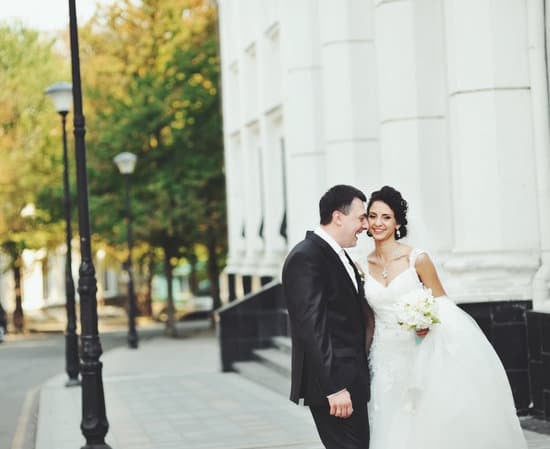Are you wondering, “can I have a Catholic wedding outdoors?” The desire for a meaningful and beautiful ceremony has led many couples to consider the possibility of exchanging their vows in an outdoor setting.
However, for couples who wish to maintain their faith traditions, it’s important to take into account the guidelines set by the Catholic Church. In this article, we’ll explore the possibilities and limitations of having a Catholic wedding outdoors, as well as provide advice for those considering this option.
The sacrament of marriage holds great significance within the Catholic faith, symbolizing the union between two individuals blessed by God. For many couples, the idea of exchanging their vows amidst natural surroundings holds a special appeal. As a result, there is a growing interest in having Catholic weddings outdoors. Understanding the traditional guidelines set by the Church and exploring potential exceptions to these rules can provide clarity for those contemplating an outdoor ceremony.
While the Catholic Church typically holds fast to certain traditions regarding wedding ceremonies, there are instances where exceptions may be made. These exceptions often require seeking permission from church authorities and an understanding of the necessary steps in planning an outdoor Catholic wedding. We will explore these processes in detail and discuss how couples can navigate through them to achieve their desired ceremony while maintaining their religious beliefs.
The Catholic Church’s Stance on Outdoor Weddings
The Catholic Church has a long-standing tradition of conducting weddings within the confines of a church. This tradition is deeply rooted in the Church’s teachings and is considered an essential sacrament for Catholics. The sacredness and solemnity of the ceremony are emphasized by the traditional setting of a church, with its holy atmosphere and spiritual significance.
The Church’s stance on outdoor weddings is clear – it does not encourage or promote them as the preferred setting for a Catholic wedding. According to traditional guidelines set by the Church, weddings are meant to take place within the sacred space of a church in order to emphasize the religious nature of the sacrament. The rationale behind this guideline is to maintain the sanctity and reverence of the wedding ceremony, which is considered a deeply spiritual and religious event.
Despite the general preference for indoor ceremonies, there are instances where the Church may permit outdoor weddings. In certain cases, such as when a couple has a strong connection to a particular outdoor location (e.g. a family estate with sentimental value), they can seek permission from their local bishop or diocese. It’s important to note that obtaining permission for an outdoor Catholic wedding involves specific criteria and should be pursued respectfully.
Exceptions to the Rule
The Catholic Church traditionally holds wedding ceremonies in sacred, consecrated spaces such as churches. However, there are exceptions to this rule that allow for outdoor weddings. The Church’s stance on outdoor weddings is rooted in the belief that a marriage is a sacrament and should be celebrated in a sacred space. This reflects the spiritual significance of the union between a man and a woman.
Exceptions to the rule can be made in certain circumstances. For example, if one of the individuals has difficulty entering and participating in a church ceremony due to physical constraints, then the Church may permit an outdoor wedding.
Another exception can be made if the couple has a deep connection to a specific outdoor location that holds significant spiritual or personal meaning to them both. In these cases, permission for an outdoor wedding can be sought from the local bishop through the couple’s parish priest.
When seeking permission for an outdoor Catholic wedding, it is important to consider that the decision ultimately lies with the local bishop. The process typically involves meeting with your parish priest, who will assist you in submitting a formal request along with any supporting documentation or reasoning for why an exception should be made. It is crucial to respect and adhere to any guidelines set forth by the Church while making your case for an outdoor ceremony.
Overall, while outdoor Catholic weddings are not the norm, exceptions can be made under certain circumstances. Seeking guidance from your local parish priest and being respectful of traditional religious guidelines can help facilitate this process smoothly.
- Discussing ways to include traditional elements in an outdoor setting
- Exploring meaningful rituals and symbols
The Benefits of an Outdoor Catholic Wedding
When it comes to celebrating the sacrament of marriage, many couples may wonder if they can have a Catholic wedding outdoors. The answer to this question is not a simple yes or no. The Catholic Church has traditional guidelines regarding the location of weddings, but there are exceptional circumstances in which outdoor ceremonies may be permitted.
For couples who feel a deep connection to nature and find spirituality in the great outdoors, an outdoor Catholic wedding can offer a unique and meaningful experience. Many people find that being surrounded by the beauty of the natural world enhances the sense of sacredness during their wedding ceremony.
One potential benefit of an outdoor Catholic wedding is the opportunity to create a visually stunning and memorable event. With the right location and thoughtful planning, couples can design a ceremony that reflects their love for each other as well as their spiritual beliefs. Whether it’s a serene garden, a picturesque vineyard, or a peaceful beach, an outdoor setting can provide a beautiful backdrop for exchanging vows and beginning married life together.
| Outdoor Wedding Benefits | Details |
|---|---|
| Connection to nature | Couples can feel spiritually connected to nature and the environment. |
| Meaningful experience | An outdoor wedding allows for unique and memorable moments. |
| Aesthetic beauty | The right location can provide a stunning backdrop for the ceremony. |
Choosing the Ideal Location
The ideal location for a Catholic outdoor wedding is one that provides a beautiful and serene setting while also allowing for the necessary religious elements of the ceremony to take place. When considering potential venues, it’s important to keep in mind that the Catholic Church has guidelines regarding where weddings can be held. While outdoor ceremonies are not traditionally part of the Catholic tradition, there are still ways to find a location that aligns with both nature and spirituality.
When seeking an outdoor venue for a Catholic wedding, couples should consider places that offer natural beauty and a sense of tranquility. Parks, gardens, and vineyards can provide picturesque backdrops for the ceremony while also evoking a feeling of reverence and solemnity. It’s essential to choose a location that does not detract from the sacredness of the occasion, but rather enhances it with its natural surroundings.
In addition to aesthetics, it’s crucial to ensure that the chosen location complies with the guidelines set by the Church for outdoor weddings. The venue should allow for the presence of a priest or deacon who will officiate the ceremony and perform any necessary rites. Couples should also consider accessibility for their guests and ensure that there are suitable facilities available at the site.
When seeking approval from the Catholic Church for an outdoor wedding venue, couples must be prepared to demonstrate how their chosen location aligns with religious requirements. This may involve working closely with their local parish or diocese to obtain permission and guidance on ensuring that all necessary elements can be incorporated into the outdoor setting.
| Considerations | Requirements |
|---|---|
| Natural beauty and serenity | Compliance with church guidelines |
| Suitability for religious rites | Accessibility and facilities |
Planning the Ceremony
When it comes to planning a Catholic wedding ceremony, there are certain steps that need to be followed to ensure that the celebration is in line with the traditions and guidelines of the Church. This holds true whether the ceremony is held indoors or outdoors. In the case of an outdoor Catholic wedding, there are additional considerations to take into account.
Outlining the Necessary Steps
The first step in planning an outdoor Catholic wedding is to get in touch with your local parish and discuss your desire for an outdoor ceremony. It is important to have an open conversation with a priest or deacon who can guide you through the process. They can provide you with information about any specific requirements or restrictions that may apply to your chosen location.
Once you have received approval from your parish, it is important to work closely with your priest or deacon to plan the specifics of the ceremony. This includes selecting appropriate readings, prayers, and music that align with the Catholic tradition. Additionally, discussing any logistical details such as seating arrangements and altar setup will also be crucial for a smooth ceremony.
Addressing the Involvement of a Priest or Deacon
In most cases, a priest or deacon will need to be present at an outdoor Catholic wedding to officiate the ceremony and ensure that it adheres to the teachings of the Church. They will play a crucial role in guiding you through the sacrament of marriage and providing spiritual counsel throughout the process. It is important to establish clear communication with them and involve them in all aspects of planning to ensure a cohesive and meaningful ceremony.
Incorporating Catholic Traditions
Even in an outdoor setting, there are ways to incorporate meaningful Catholic traditions into your wedding ceremony. Whether it’s including rituals such as lighting a unity candle or incorporating symbolic elements like crucifixes or statues, these traditions can add depth and spirituality to your celebration. Working closely with your priest or deacon can help you identify which traditions would be most appropriate for an outdoor setting while still maintaining their significance within the context of a Catholic wedding.
Incorporating Catholic Traditions
Ways to Include Traditional Elements Outdoors
When planning an outdoor Catholic wedding, it’s important to find meaningful ways to incorporate traditional elements into the ceremony. One way to do this is by incorporating the symbol of the crucifix, whether it’s a physical cross or a representation of it in the ceremony space.
Additionally, couples can choose to have a unity candle ceremony, which symbolizes the union of two individuals becoming one in marriage. Another option is to include a reading from the Bible that holds special significance for the couple.
Exploring Meaningful Rituals and Symbols
There are several meaningful rituals and symbols that can be incorporated into an outdoor Catholic wedding. For example, the exchange of rings during the wedding ceremony represents the couple’s commitment to each other and their fidelity. Another popular tradition is the presentation of flowers to Mary, symbolizing devotion and honor for the Mother of God. The use of sacramentals such as holy water or blessed objects can also add a sacred element to an outdoor Catholic wedding.
Seeking Guidance From Church Community
As couples explore ways to incorporate Catholic traditions into their outdoor wedding, seeking guidance from their church community can be incredibly valuable. Speaking with a priest or deacon about the specific traditions they would like to include can provide insight into how best to incorporate them into an outdoor setting while still honoring religious guidelines.
It’s important that couples approach these conversations with an open mind and willingness to adapt in order to ensure that these cherished traditions can be included in their special day.
By finding creative ways to include traditional Catholic elements in an outdoor setting and seeking guidance from their church community, couples
Outdoor Wedding Do’s and Don’ts
Planning an outdoor Catholic wedding can be a beautiful and meaningful experience, but it is important to keep in mind certain dos and don’ts to ensure that the ceremony aligns with the guidelines set by the Church. One of the most important dos for an outdoor Catholic wedding is to seek permission from the Church.
As discussed in previous sections, the Catholic Church typically prefers weddings to take place in a sacred space such as a church building. However, there are instances where the Church may grant permission for an outdoor ceremony, so it is essential to consult with a priest or deacon and follow the proper process for seeking approval.
Another important do for an outdoor Catholic wedding is to choose a suitable location that respects religious guidelines. When selecting an outdoor venue, couples should consider factors such as access to restrooms, parking facilities, and seating arrangements that can accommodate all guests comfortably. It is also crucial to ensure that the chosen location allows for the participation of a priest or deacon and provides a suitable space for traditional Catholic rituals.
On the other hand, there are certain don’ts that couples should keep in mind when planning an outdoor Catholic wedding. One common pitfall to avoid is disregarding the importance of religious traditions and guidelines.
Even though an outdoor setting can provide a unique backdrop for the ceremony, it is essential to maintain reverence and respect for the sacrament of marriage. Additionally, couples should refrain from making impulsive decisions about their ceremony without consulting with their parish community or seeking guidance from a knowledgeable clergy member.
Conclusion
In conclusion, the desire to have a Catholic wedding outdoors is certainly understandable, as many couples seek to connect their special day with the beauty of nature and the spiritual significance it can bring. However, it’s important to note that traditionally, the Catholic Church has set guidelines for weddings to be held within a sacred space, such as a church. These guidelines serve to uphold the sacredness and traditions of the sacrament of marriage.
While the Church generally prefers weddings to take place within its walls, there are instances where outdoor weddings can be permitted. It’s important for couples to understand these exceptions and follow the process for seeking permission from their local diocese or priest. By doing so, they can ensure that their desires align with the teachings and regulations of the Church.
Ultimately, couples should consider not only their personal preferences but also the spiritual significance of their wedding ceremony. Whether indoors or outdoors, what truly matters is creating a meaningful and reverent experience that reflects the couple’s devotion to each other and their faith. And while an outdoor Catholic wedding may require additional planning and adherence to guidelines, it can undoubtedly result in a beautiful and spiritually uplifting celebration for both the couple and their guests.
Frequently Asked Questions
Can a Catholic Marry Outside the Church?
Yes, a Catholic can marry outside the Church, but there are certain conditions that need to be met in order for the marriage to be considered valid by the Church. The couple would need to seek permission from their local bishop and go through a process called “dispensation from canonical form.”
This involves obtaining official permission to marry in a non-Catholic ceremony.
Is It a Mortal Sin for a Catholic to Marry Outside the Church?
Marrying outside the Church without the required permission could be considered a mortal sin according to Catholic teachings. The Church considers marriage a sacrament, and therefore marrying outside of its regulations could be viewed as a serious violation of the teachings of the Church.
However, individual circumstances and reasons behind the decision will also be taken into account by the Church in determining if it is indeed a mortal sin.
Can a Catholic Have Two Wedding Ceremonies?
In some cases, a Catholic may have two wedding ceremonies – one civil ceremony for legal purposes and one religious ceremony within the Catholic Church. However, it’s important that both ceremonies are done with full transparency and honesty, following all necessary procedures within both contexts.
The couple should consult with their priest or diocese for guidance on how to proceed with having two wedding ceremonies in accordance with Catholic teachings.

I have been involved in marriages for over 20 years helping couples and singles understand more about them.





